Video (2 min) on the crackdown against women human rights defenders in Saudi Arabia, Middle East Eye, 23 December 2018.
Human rights defenders use the UN Human Rights mechanisms to seek the release of women human rights defenders and demand accountability for their torture.
Saudi Arabia has attempted to silence women human rights defenders for decades. Authorities continuously violate the right to peaceful assembly, curb the formation of independent civil society organisations, and restrict freedom of expression for Saudi activists.
In 2018, the Saudi government made a wave of arrests targeting women human rights defenders because of their online activism and support to social media campaigns for women’s rights such as securing women’s right to drive in Saudi Arabia (#Right2Drive) and against the country’s male guardianship system (#IAmMyOwnGuardian).
Under the male guardianship system, Saudi women are obliged to have a male guardian (usually father or husband) who has the authority to make a range of decisions for her, such as marriage or divorce. Organisations have compared this to designating women as legal minors.
In May 2018, weeks before the lifting of the driving ban, the Saudi government arrested several prominent Saudi women human rights defenders who had for years peacefully advocated for the right of women in the Kingdom to drive, as well as for broader reforms related to the repressive male guardianship system.
On 15 May 2018, Loujain Al-Hathloul, a prominent defender of women’s right to drive, was abducted in the United Arab Emirates, brought to Saudi Arabia against her will and arbitrarily detained.
In the days and weeks that followed, other women’s rights defenders were arrested and detained across the country, as part of the Saudi authorities’ crackdown against Saudi women’s rights activists.
Women activists have faced judicial harassment - many detained on vague security charges, for example, being in contact with international human rights organisations, or cooperating with foreign journalists, media institutions and entities “hostile to the Kingdom”.
Reports emerged which confirmed that some of the detained women activists have been subjected to electrocution, flogging, sexual harassment and other forms of torture and human rights violations while in prison and yet, no perpetrator has been held accountable (20 November 2018).
“In prison, many suffered mental and physical anguish – including torture, sexual abuse and solitary confinement”
Lynn Maalouf, Amnesty International’s Middle East Research Director. 20 November 2018.
For the first three months of their detention, the women were held incommunicado with no access to family or lawyers. Several were also subjected to lengthy spells in solitary confinement.
In 2019, the Saudi government took measures to implement some of the activists’ demands: lifting the ban on driving for women, and some restrictions of the male guardianship system, although the patriarchal and oppressive system is not entirely dismantled yet.
In March 2019, three women activists were temporarily released, however, all of them continue to face trial and many remain at risk of being sentenced to prison under anti-cybercrime legislation for their human rights work.
Several other women are still detained for defending their rights.
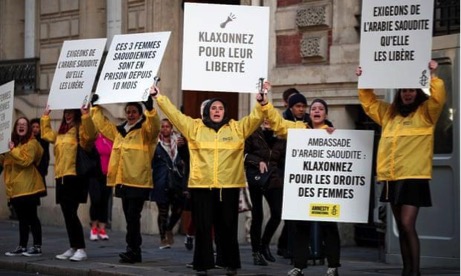 Photo: Demonstrators from Amnesty International protest outside the Saudi Arabian embassy in Paris to release the jailed female activists. By Benoît Tessier/Reuters.
Photo: Demonstrators from Amnesty International protest outside the Saudi Arabian embassy in Paris to release the jailed female activists. By Benoît Tessier/Reuters.
Mobilising NGO Coalitions
With very little room for manoeuvre in Saudi Arabia, human rights defenders mobilised organisations outside Saudi Arabia, and worked in coalitions with international NGOs.
Together their campaigns called on the UN to hold Saudi Arabia to account for the arbitrary detention and torture of women human rights defenders, and call for their release. This campaign mobilises both media and coalitions of civil society organisations, as well as amplifies the voices of those affected by this issue.
The campaign was launched in 2018 by members of the Free Saudi Women Coalition, including Women’s March Global and Coalition partners, the Gulf Centre for Human Rights (GCHR), International Service for Human Rights (ISHR), CIVICUS, and Americans for Democracy and Human Rights in Bahrain (ADHRB).
The coalition advocates for the immediate and unconditional release of Saudi women human rights defenders and accountability for their torture. The NGO coalition has used various UN mechanisms and windows of opportunities, adapting its strategy according to the evolving context, advocating to put Saudi Arabia onto the Human Rights Council agenda.
Please stand with Saudi women rights defenders Samar Badawi, Nassima al-Sadah, Loujain al-Hathloul, Eman al-Nafjan and Aziza al-Yousef who were arrested for their human rights activism. #FreeSaudiActivists #StandWithSaudiFeminists #IAmMyOwnGuardian https://t.co/2LwE6pfM3L pic.twitter.com/OMM2t9uwB0
— CiLuna (@CiLuna27) August 28, 2018
Launching of Petition
In May 2018, a member of the NGO coalition, Women’s March Global, launched a petition (through the change.org platform) calling for the release of Saudi women activists. The aim of the petition was to increase pressure on the UN to hold Saudi Arabia accountable for the imprisonment and ill treatment of women human rights defenders.
On 3 July 2018, the organisation announced that the petition had been sent to UN officials and Saudi representatives. By November of that same year, the petition had reached over 260,000 signatures. In March 2019, Women’s March Global cited the petition at the 63rd session of the Commission on the Status of Women as an example of support behind the Coalition’s advocacy efforts.
The petition was also widely mentioned in the media:
Lobbying States prior to UN Human Rights Council Sessions
In June 2018, the NGO Coalition lobbied States ahead of the Human Rights Council’s 38th regular session, encouraging them to raise the issues in Saudi Arabia in their national statement. The NGO Coalition also delivered a joint statement at this HRC session calling attention to the detention of the women human rights defenders without knowing at this point that the women were being subjected to torture. The main goal of this collective action at this stage was to raise awareness about the situation of the women activists and get States to pay attention to this issue.
#SaudiArabia We have signed onto a statement with over 30 other orgs on the recent crackdown on #HRDs and #WHRDs. Those arrested include advocates and supporters of the #Oct26driving, #Right2Drive and #IAmMyOwnGuardian campaigns Read the statement here: https://t.co/ot33FAmg3o pic.twitter.com/6PW9RndOjK
— Front Line Defenders (@FrontLineHRD) June 7, 2018
In 2018, over 170 NGOs globally called for a Special Session of the Human Rights Council to focus specifically on the increasing and widespread attacks against journalists, activists, and other forms of civil society repression in Saudi Arabia. The statement also called for the suspension of Saudi Arabia as a member of the Council. The NGOs highlighted the urgency of the situation in the country, arguing that there would be strong support for a Special Session at the Council, and also calling for the condemnation of Saudi Arabia in their public statements.
As the NGO coalition realised that an HRC special session was unlikely to happen, it decided instead to lobby member States to make a joint statement at the upcoming Council session in March 2019. The coalition argued that if the Human Rights Council remained silent on this issue, this would set a dangerous precedent as other States may feel emboldened to follow Saudi Arabia’s footsteps, knowing that there would be no consequences. As Saudi Arabia was a member of the Human Rights Council, NGOs argued the need for the State to be held to heightened scrutiny, in particular by other HRC members.
On 2 March 2019, ahead of the 40th regular session of the Human Rights Council, over 50 NGOs signed a statement urging UN Member States to adopt a resolution at the Council calling for the immediate and unconditional release of the detained Saudi women human rights defenders and establishing a monitoring mechanism over the human rights violations in the country.
Submitting Information to the UN Special Procedures
NGOs also sent several submissions to Special Procedures, calling on them to amplify their ask and push for getting the issue on the Human Rights Council agenda. The Special Procedures continued to write letters (or “communications”) to the Saudi government demanding the women’s rights defenders unconditional release:
Making Submissions and Lobbying States for the Universal Periodic Review
As part of Saudi Arabia’s Universal Periodic Review (3rd cycle) held in November 2018, NGOs sent their consolidated submission to all the States who typically make recommendations in the UPR process on women’s rights*, or on human rights defenders. NGO representatives met with permanent missions in Geneva, urging them to make specific recommendations to the Saudi government calling for the release of the women human rights defenders and demanding accountability for their torture. The NGOs had two goals in relation to the Universal Periodic Review:
* In order to identify what States were potential allies, defenders reviewed past UPR cycles for Saudi Arabia and analysed previous recommendations. For instance, in the 2nd cycle in 2013, Norway had recommended to Saudi Arabia to “Remove all obstacles to freedom of expression and movement against human rights defenders, including all travel bans”. In 2018, Norway followed up by calling on Saudi Arabia to “Ensure a safe and enabling environment for all human rights defenders, in particular for women human rights defenders and journalists”. Also see the UPR Info Database.
Leveraging Opportunities and Lobbying Diplomats
Despite Saudi Arabia’s abysmal human rights record, other States have been reluctant to call it out publicly. However, in October 2018, following the disappearance and murder of Saudi journalist Jamal Kashoggi in the Saudi consulate in Turkey. As a result of the brutal killing of the journalist, many States came out to condemn Kashoggi’s killing and the media coverage too was so immense - it made it difficult for many States not to act. The NGO coalition saw this as a window of opportunity to raise the issues of the women activists, who were also subjected to the oppression and persecution of the Saudi government.
When trials of the women activists were stalled, and then resumed in February 2020, the NGO coalition continued to lobby diplomats to request the Saudi government to attend the hearings in Riyad. While in the end they were not allowed to enter, it nevertheless helped increase the political pressure on the Saudi government.
Working with the UN Treaty Bodies
CEDAW
As Saudi Arabia had ratified the Convention on the Elimination of Discrimination Against Women in 2000, it was required to submit periodic reports for review to the Committee on the Elimination of Discrimination Against Women (CEDAW). On 27 February 2018, Loujain Al- Hathloul, one of the women activists who had been instrumental in the movement to allow women to drive and the push to end male guardianship laws, attended a public meeting in Geneva to brief members of the committee on the human rights situation of women in Saudi Arabia. Her briefing formed part of the Committee's review of Saudi Arabia’s implementation of the Convention.
A few weeks later on 15 May 2018, she was arrested in Saudi Arabia on national security grounds, and was in detention until February 2021. (See section on Follow the Story for an update, as Loujain has now been freed.) According to the charges, her arrest was based on her activism including her engagement with CEDAW.
Since the women human rights defenders had been targeted for engaging with CEDAW, the NGO coalition worked with the Committee to release a public statement ahead of Loujain’s hearing in March 2020 to push for her release.
UNCAT
In May 2016, the UN Committee Against Torture (UNCAT) made a series of observations in regards to the situation in Saudi Arabia. In their report, the UNCAT highlighted the violations committed against the human rights defenders and requested further information from the government.
In 2017, Saudi Arabia provided a response to the observations that the UNCAT in December 2018 deemed insufficient: “the State Party should acknowledge, in law and in practice, the legitimacy of peaceful criticism and advocacy relating to violations of the Convention [Against Torture]”
In June 2019, NGOs submitted a joint follow up report on Saudi Arabia to the UNCAT.
Human Rights Council
- Government statement: During the interactive dialogue with the UN High Commissioner, Iceland, delivered the first joint statement on Saudi Arabia behalf of 37 member States. The statement condemned the killing of Kashoggi, demanded accountability, and called for the release of human rights defenders who are detained for exercising their fundamental freedoms, thus putting the release of women human rights defenders at the forefront.
“This was the first time ever that States at the Human Rights Council collectively condemned human rights violations committed inside Saudi Arabia, a country that has until now escaped Council scrutiny despite being a Council member with an appalling human rights record.”
Salma El Hosseiny, International Service for Human Rights (ISHR)
- NGO statement: In a joint statement ISHR, CIVICUS and Lawyers Rights Watch Canada, called on the Saudi authorities to release all human rights defenders detained for exercising their fundamental rights as well as to accept recommendations for the protection of human right defenders. This was made during the UPR debate. Watch the video.
- Government statement: Australia delivered the second joint statement on Saudi Arabia on behalf of 35 states expressing their concern over the persecution and intimidation of activists, including women human rights defenders, as well as widespread torture, extrajudicial killings, enforced disappearances, unfair trials, arbitrary detention, and impunity. It calls on the Saudi government to end impunity, including for the murder of Saudi journalist Jamal Khashoggi, accept visits by UN experts, end the death penalty, and ratify international human rights treaties.
“The international community sent a strong and clear message to the government of Saudi Arabia that its crimes won’t go unanswered and that as a Council member, it will be held to heightened scrutiny.”
Salma El Hosseiny, International Service for Human Rights (ISHR)
- NGO statement: ISHR delivered a statement on Saudi Arabia calling on the Human Rights Council to hold Saudi Arabia accountable for human rights violations. Watch the video.
- NGO statement: NGOs provided space for the sister of one of the detained women human rights defender to deliver an oral statement at the Human Rights Council. Lina al-Hathloul called for the release of her sister and accountability for her torture. Watch the video.
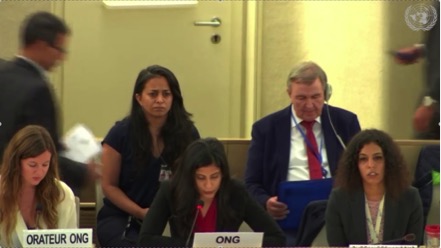 Photo: Lina Al-Hathloul delivers a statement at the 42nd regular session of the Human Rights Council. By International Service for Human Rights, 23 September 2019.
Photo: Lina Al-Hathloul delivers a statement at the 42nd regular session of the Human Rights Council. By International Service for Human Rights, 23 September 2019.
- OHCHR statement: During her oral update to the Council, the UN High Commissioner for Human Rights, Michelle Bachelet, expressed her deep concern about the continued arbitrary detention of Saudi women human rights defenders and urged their immediate release.
“In Saudi Arabia, I am deeply concerned about the continued arbitrary detention of women human rights defenders who have demanded that Saudi Arabian women be empowered to make their own choices, as equals to men. They should be released without delay.” Michelle Bachelet, UN High Commissioner for Human Rights, September 2020
- Government statement: During this session, Denmark delivered a cross-regional joint statement at the UN Human Rights Council on behalf of 33 States raising concerns over the human rights situation in Saudi Arabia and called on the State to release detained women human rights defenders. (ISHR article)
“We deeply regret the continued detention of at least five women’s human rights defenders, arrested in 2018. We reiterate our call for the release of all political detainees and are particularly concerned about the use of the counter-terrorism law and other security provisions against individuals peacefully exercising their rights.”
Special Procedures
After NGOs initially issued communications to Special Procedures, the mandate holders issued press releases and statements in regard to the issue, making specific requests to the Saudi government, including:
- 14 June 2018: UN Special Procedures sent an urgent appeal raising concerns about the arrest and charges, reprisals, and enforced disappearances of women’s rights defenders and other human rights advocates. Special Procedures requested clarification on these cases from the Saudi government, including information on access to legal counsel, and that the Kingdom provide information on current measures taken to ensure their safety. Saudi Arabia did not comply with such requests.
- 27 June 2018: Nine independent UN experts issued a statement, emphasising that women human rights defenders face compounded stigma, not only because of their work as human rights defenders, but also because of discrimination on gender grounds.
“In stark contrast with this celebrated moment of liberation for Saudi women, women's human rights defenders have been arrested and detained on a wide scale across the country, which is truly worrying and perhaps a better indication of the Government's approach to women's human rights.”
- 12 October 2018: OHCHR releases a press statement that UN experts again called for the release of all detained women human rights defenders in Saudi Arabia. They urged Saudi Arabia to immediately and unconditionally release all women human rights defenders, including six defenders who remain in jail on charges relating to their peaceful defence of human rights.
“We condemn in the strongest possible terms the actions of the Saudi authorities against these women human rights defenders and we call on them, as a matter of urgency, to immediately release and drop the charges against all of them.”
The Special Procedures had released a communication on 10 October 2018.
- 8 February 2019: special rapporteurs send a communication to the Saudi Government concerning torture, sexual harrassment and ill treatment of six women human rights defenders. Through the letters, they requested further information on the situation of these women and the measures taken to ensure their wellbeing.
- 8 August 2019: UN experts welcome royal decrees reducing obstacles for women under the male guardianship system and remember the situation of WHRD prisoners.
- 27 September 2019: in response to the demands from NGOs to mark Loujain’s 500 days of detainment, nine Special Procedures, including the Special Rapporteur on the situation of human rights defenders and the Special Rapporteur on violence against women, made a joint statement calling on Saudi Arabia to “immediately release Ms Al-Hathloul and all other human rights defenders in Saudi prisons, and urging the Government to launch a prompt, effective and independent investigation into whether she has been tortured”.
- 2020: Special Procedures demanded the protection of detainees and the freedom of women activists in press releases in February 2020 and December 2020. They expressed particular concern in the context of Loujain’s trial and urged for her immediate release. They also released a communication in June 2020.
In June 2019, the Special Rapporteur on extrajudicial killings presented to the Human Rights Council the result of an investigation into the killing of Kashoggi, which found Saudi Arabia government as responsible. The report found credible evidence that the former senior advisor to the Saudi prince was involved in the killing, and that he was physically present during the torture of women human rights defenders and threatened to kill one of them. This case created an opportunity for human rights defenders to call for the release of women human rights defenders still in jail in Saudi Arabia.
Universal Periodic Review
Saudi Arabia was under review (3rd cycle) in November 2018.
During the UPR of Saudi Arabia, some States made oral statements. For example, the United Kingdom expressed concern about the Saudi government’s rejection of its recommendation to end the use of the specialised criminal courts and the prevention of diplomats from monitoring trials including the trials of the women human rights defenders.
During Saudi Arabia’s Review in November 2018, Saudi Arabia received at least 22 recommendations calling for the release of human rights defenders, including women human rights defenders, from detention, and to guarantee a safe and enabling environment to do their work.
ISHR delivered a statement at the Human Rights Council during the UPR debate on behalf of three NGOs calling upon the Saudi authorities to immediately and unconditionally release women defenders, and all other individuals detained for exercising their fundamental freedoms and to drop all charges against them (read the statement).
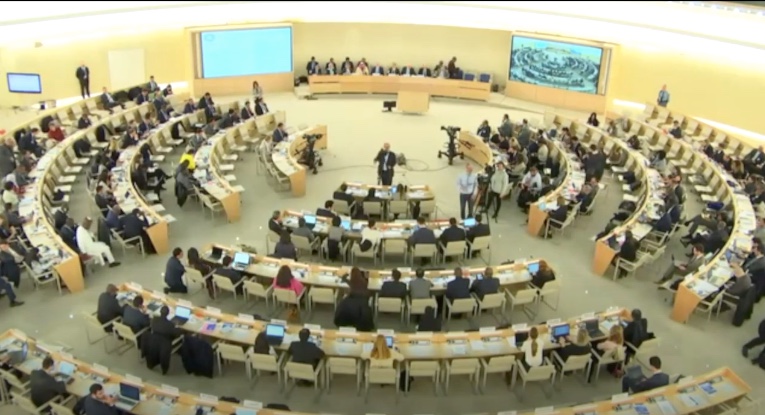 Oral statement by ISHR on Saudi Arabia's Universal Periodic Review. Delivered on 14 March 2019 at the Human Rights Council's 40th regular session.
Oral statement by ISHR on Saudi Arabia's Universal Periodic Review. Delivered on 14 March 2019 at the Human Rights Council's 40th regular session.
Treaty Bodies
CEDAW
On 28 February 2020, the CEDAW (Committee on the Elimination of Discrimination against Women) urged Saudi authorities to release Al-Hathoul and all women human rights defenders. The Committee had intervened repeatedly on behalf of Loujain Al-Hathoul under its reprisals mandate, and made its latest call in a statement issued to mark the second anniversary of her participation in the review of Saudi Arabia.
On 5 November 2020, the Committee expressed their serious concern over Al-Hathloul’s detention conditions. Al-Hathloul was on hunger strike to protest denial of her right to regular contact with her family.
More recently, the CEDAW called on Saudi Arabia to release all detained women human rights defenders, including Saudi women’s rights activist Loujain Al-Hathloul, in the wake of International Women Human Rights Defenders Day on 29 November 2020.
“We, the Committee experts, are gravely concerned about Ms. Al-Hathloul’s physical and mental health and well-being particularly in light of her hunger strike. We urge the Saudi authorities to protect her rights to life, health, and liberty and security of person at all times, while fully respecting her freedoms of conscience and expression, including by going on hunger strike.” CEDAW, 29 November 2020
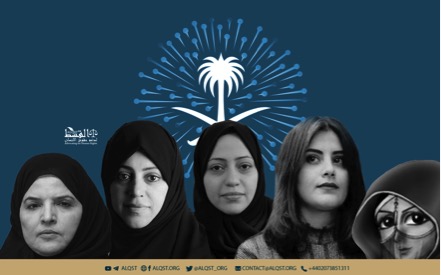 Photo: ALQST Advocating for Human Rights, 3 January 2019.
Photo: ALQST Advocating for Human Rights, 3 January 2019.
At national level
Weeks after the statements made at the 40th regular session of the Human Rights Council, on 28 March 2019, the Saudi authorities provisionally released two women human rights defenders who were arrested in mid-May 2018 during the crackdown against women rights activists, as well as an academic who had been arrested in September 2017 during the crackdown against Islamist figures. On 2 May 2019, five women human rights defenders were provisionally released, and another also released on 2 May. On 10 February 2021, it was reported that Loujain Al-Hathloul, and Nouf Abdulaziz were released conditionally from prison.
At international level
At the Human Rights Council
In 2019, the UN Human Rights Council shone an unprecedented spotlight on human rights violations in Saudi Arabia. In June 2019, the Council’s experts documented Saudi Arabia’s responsibility for the murder of Khashoggi. In September 2019, 25 States led by Australia called on Saudi Arabia to adhere to its Council membership obligations and take concrete steps to improve its human rights record.
In April 2020, Saudi Arabia introduced some partial criminal justice revisions.
Human Rights Council and other international presence
In October 2020, Saudi Arabia was seeking re-election to the Council.
The Saudi government was eager to present itself as a ‘reformer’ and sought acknowledgement from the international community, which represents another leverage point which could be used strategically to pressure the State to address the cases of women human rights defenders, calling for their immediate and unconditional release and accountability for their torture.
In the October 2020 election campaign at the Human Rights Council, Saudi Arabia did not get re-elected.
“The fact that Saudi Arabia, a country with a record of serious human rights violations and poor cooperation with UN human rights mechanisms, was not elected, demonstrates the importance of competitive elections.” Salma El Hosseiny, International Service for Human Rights (ISHR)
Statements by Diplomats
Joint statement by Human Rights Ambassadors from UK, Netherlands, Germany, Sweden, Estonia, Luxembourg, and Finland, coinciding with International Day for Women Human Right Defenders on 29 November 2020.
Joint statement by human rights ambassadors from ?? ?? ?? ?? ?? ?? ?? on women’s rights activists in Saudi Arabia ??#IWHRDD #16Days pic.twitter.com/szCU95JW0w
— Rita French ?? (@RitaFrenchFCDO) November 29, 2020
Media Coverage
In this case, the coalition of NGOs chose to focus on one of the many recommendations of the Special Procedures, which was “If Saudi Arabia wants to commit and show guarantees of non-recurrence, then a first step of good faith is to release all of those detained for exercising their rights”.
Broad-based alliances. Campaigns are more likely to succeed when they bring together a broad range of individuals and groups as a unified voice, with each using its comparative advantage. Campaigns are even stronger if they are able to engage unlikely allies that broaden the campaign’s appeal. Work in coalitions! This is equally important for movement building as well as sustaining collective action. When coalitions disagree, as is usual, this only helps to strengthen, refine, and nuance the campaign.
Opportunistic advocacy. This refers to flexibility in adapting the advocacy strategy according to the UN agenda and the international context. Many of the strongest campaigns take advantage of specific external events or developments that offer unique advocacy opportunities. In some cases, activists work to keep an issue alive for years, waiting for the right moment to secure change. Be ready to identify the opportunity.
In this case, in October 2018, following the murder of Saudi journalist Jamal Khashoggi in the Saudi consulate in Turkey and its global condemnation, the NGO coalition saw a window of opportunity - the focus on Saudi Arabia over the Khashoggi case, allowed the NGOs to bring up other issues such as the women human rights defenders who were still detained.
Solid research. Research, investigation, and documentation are among the most powerful tools of human rights advocacy. You can channel a lot of the documentation you may already be compiling at the national level through the UN system - through information to the Special Procedures, through submissions to the Treaty Bodies and the Universal Periodic Review. No movement or campaign can succeed without solicy facts to back up its claims. And once you have them, you also need to know where to send this information so that their use can have the greatest impact.
Leadership by those most affected. Leadership must come from those most affected by human rights violations, or at the very least their input, consent and buy-in into the campaign remains crucial. When leadership comes from those most affected, the campaigns are relevant, honest, genuine, and often make the most effective and credible change.
“No human rights effort succeeds with a single strategy. The most effective efforts use all of the above. Even then, there is no guarantee of success. But the victories of the human rights movement have offered useful lessons about how to achieve real change and protect the rights of the most vulnerable.” Jo Becker: "5 ways to a successful human rights campaign"
While several women human rights defenders who were arrested in May 2018 have been provisionally released, others are still in prison. Their trials have been stalled - initially referred to court in March 2019, their hearings (scheduled in April 2019) were postponed with no reason. The trials only recommenced in February 2020, and then again the final hearings (scheduled for March 2020) postponed indefinitely due to COVID-19.
The international human rights campaign seeking the release of the Saudi women activists continues.
In November 2020, over 30 organisations from across the world sent a letter to the President of the Human Rights Commission in Saudi Arabia urging the immediate and unconditional release of Saudi women’s rights defenders.
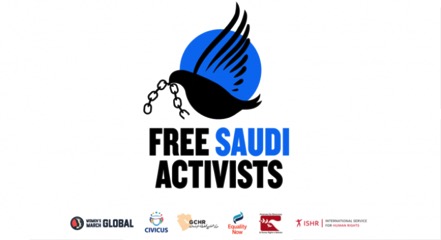
On 26 October 2020, woman human rights defender Loujain Al-Hathloul began an open-ended hunger strike in protest of her detention conditions and against the continued arbitrary refusal to permit regular phone calls with her family.
On 25 November 2020, the Criminal Court of Riyadh ruled that it has no jurisdiction over the case of woman human rights defender Loujain Al-Hathloul and transferred her case to the Specialised Criminal Court which deals with cases of terrorism.
On 28 December 2020, women human rights defenders Miyaa Al-Zahrani and Loujain Al-Hathloul were each sentenced to five years and eight months in prison, and in March 2021, it was confirmed that Nassima Al-Sadah had been sentenced to five years. For the first two activists, the sentence includes a suspension of 2 years and 10 months in addition to the time already served. Al-Hathloul is also required to serve three years of probation and a five year travel ban. She has since been released by the government (see more information on her release below).
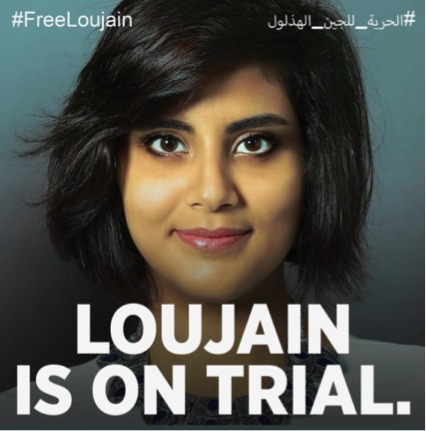 Loujain is home! But not free.
Loujain is home! But not free.
On 10 February 2021, Loujain Al-Hathloul and Nouf Abdulaziz, were conditionally released by the Saudi authorities.
To this day, there has been no accountability for their torture and ill treatment.
Loujain is home, but she is not free. She is still under a travel ban and probation. Her release is thanks to the tireless advocacy of her family and supporters. Those who tortured Loujain must be held accountable and Saudi Arabia must guarantee her right to remedy pic.twitter.com/cMlNKrjEBx
— Salma El Hosseiny (@salma_ishr) February 10, 2021
"All my sister has done is ask for women to be treated with the dignity and freedom that should be their right. For that, the Saudi authorities are seeking the maximum sentence available under the law – 20 years in prison." @LinaAlhathloul #FreeLoujain ?https://t.co/MQCpMR4m9S
— Katia Roux (@KatiaMRoux) December 19, 2020
Follow Loujain al-Hathloul on Twitter
Track the Coalition’s advocacy efforts.